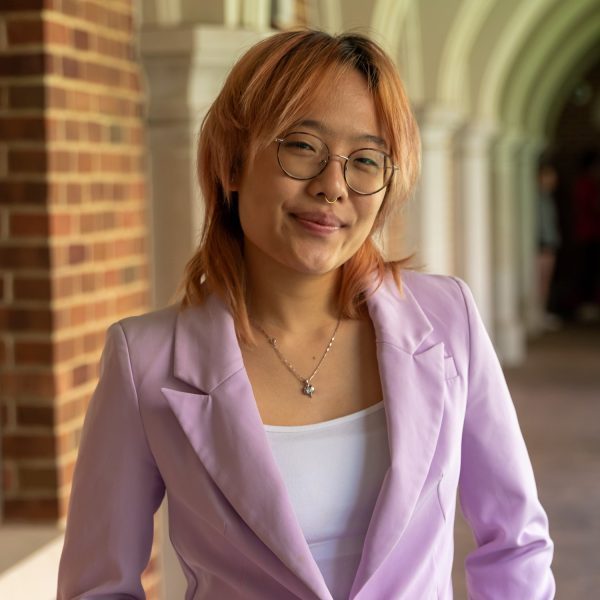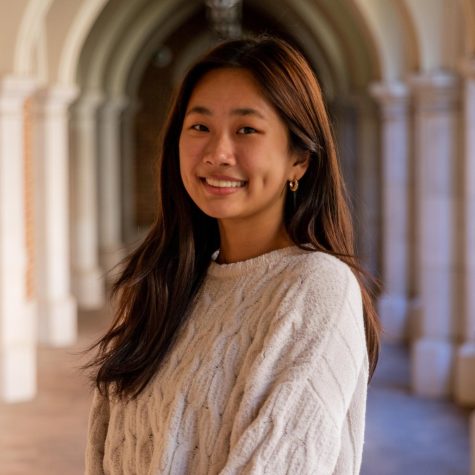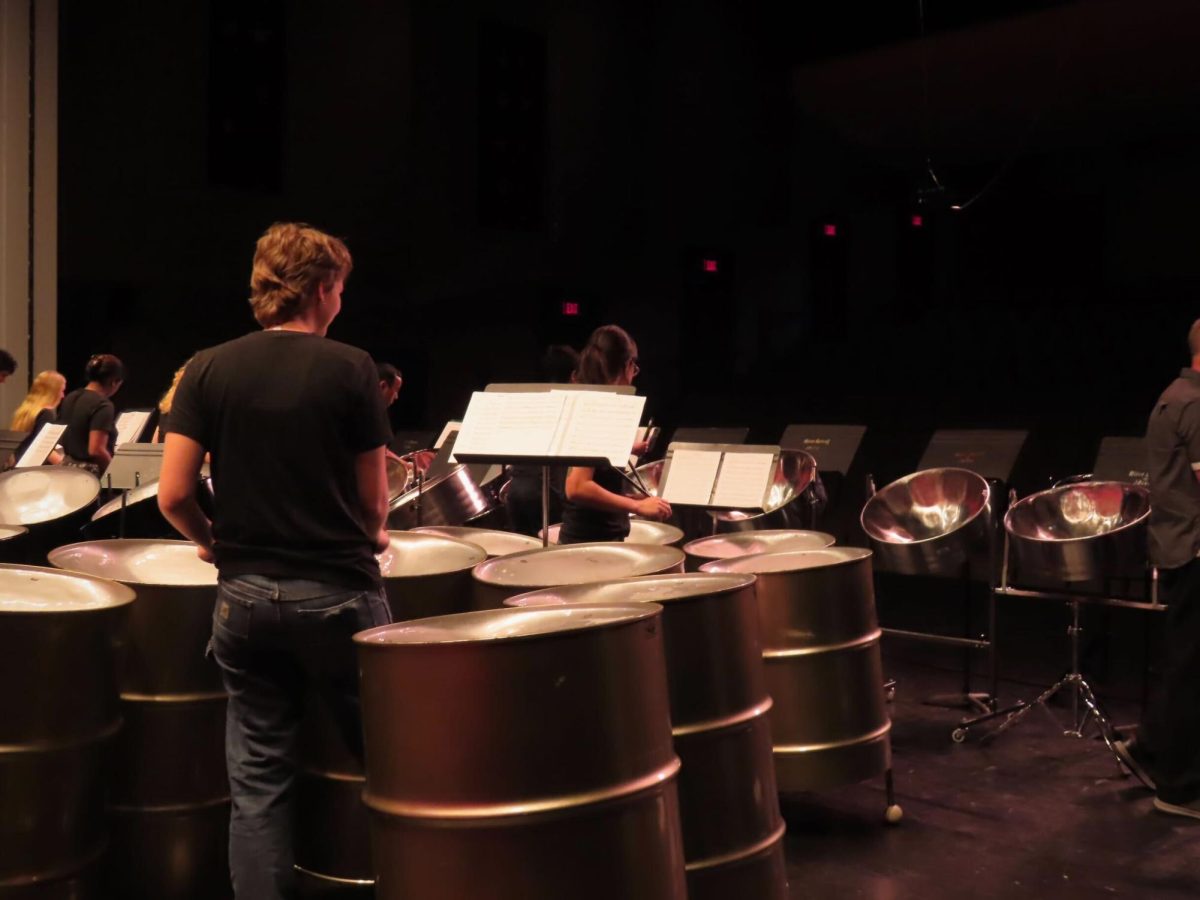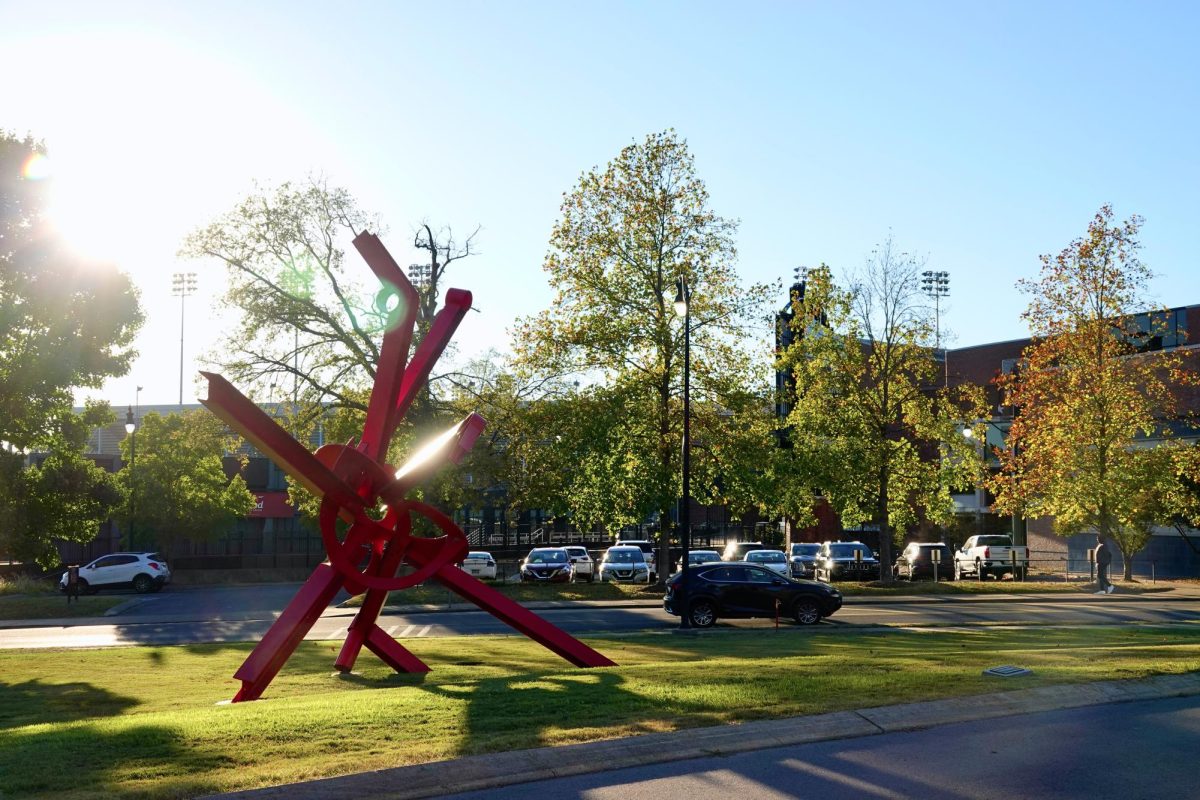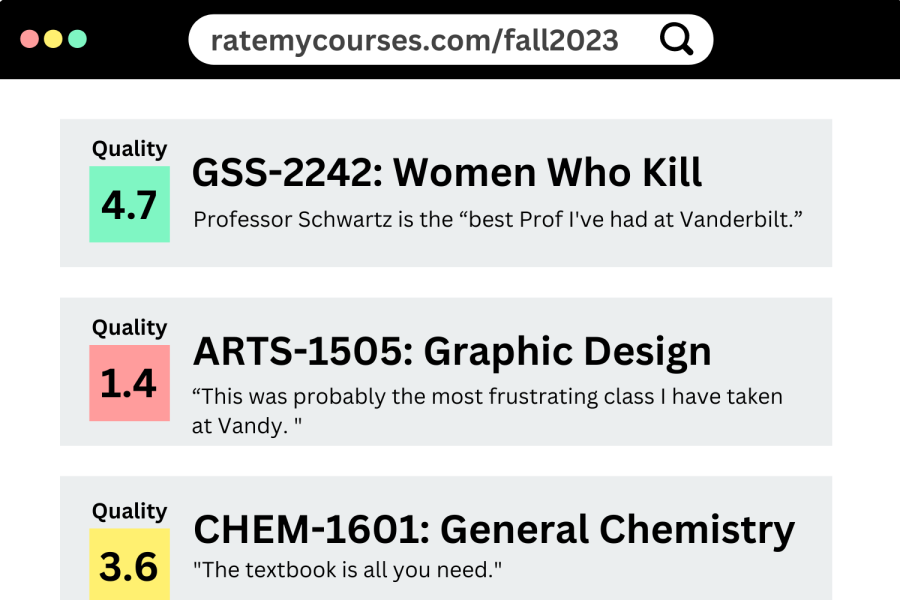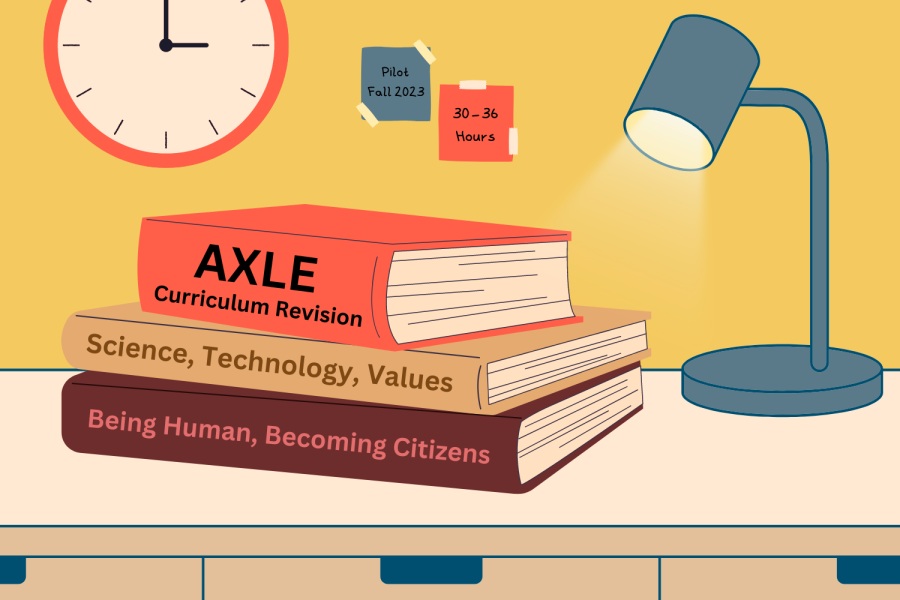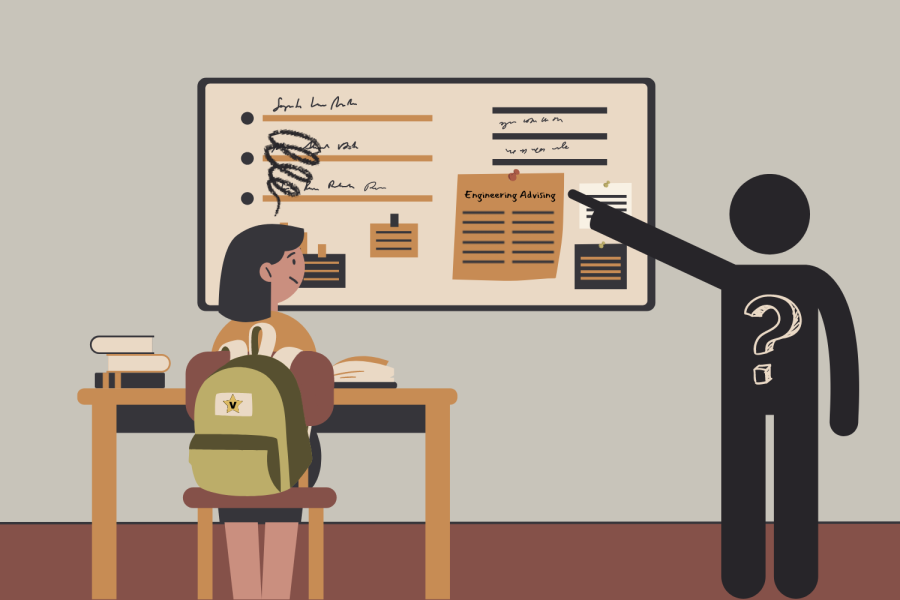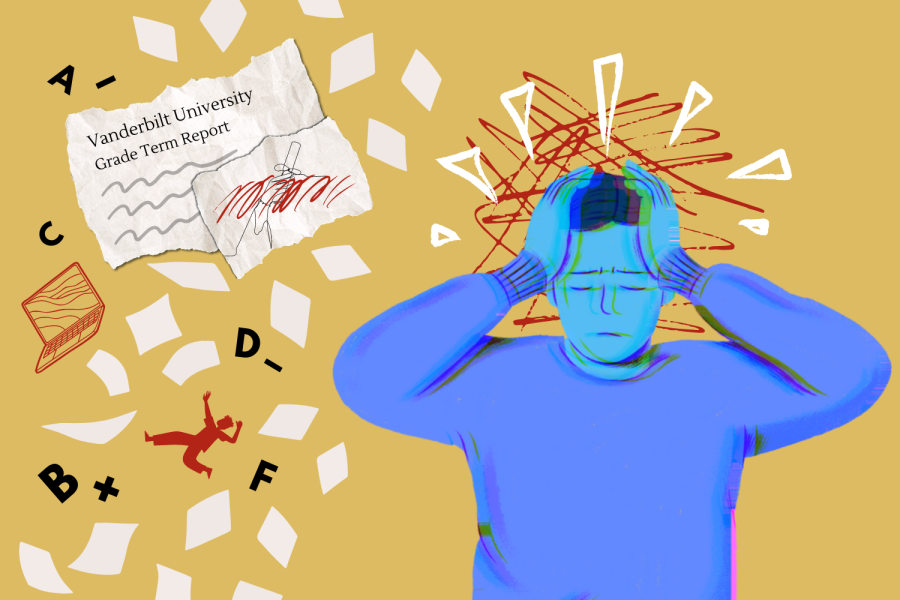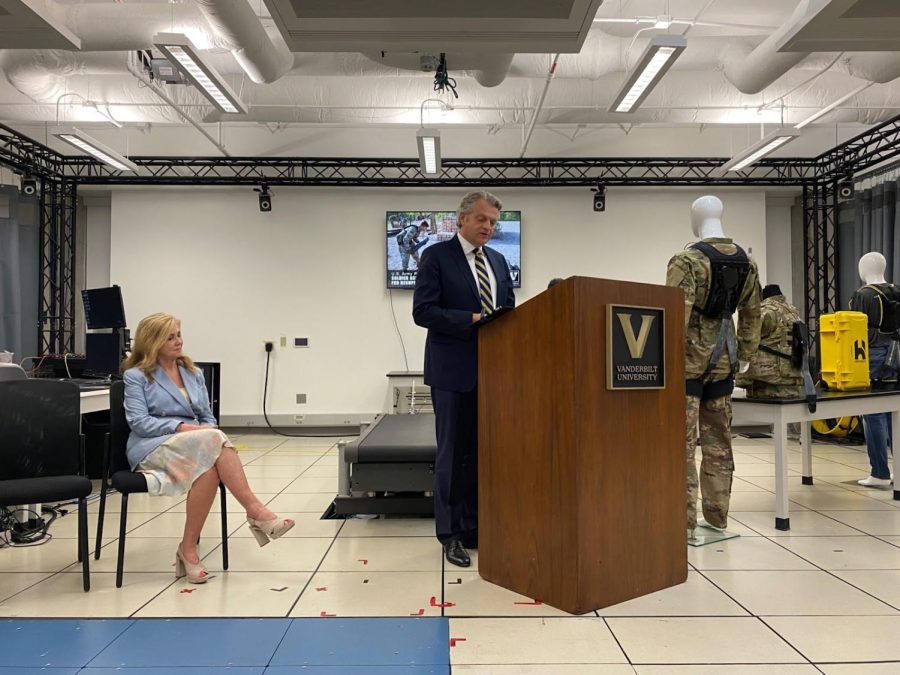As the name suggests, midterm exams are traditionally thought of as assessments taken halfway through the academic semester. Yet at Vanderbilt, today — the last day of the Spring 2024 semester — ranks second in days with the highest frequency of midterms. Below, The Hustler uncovers what a midterm really is, investigating the timing, number and weights of midterm exams, papers and projects across all four schools at Vanderbilt.
For the purposes of this article, the term “midterm” includes exams, papers and projects due before or on the last day of classes. The weeks of the semester are counted from Monday to Sunday over the course of the spring semester — from Jan. 8 to April 22 — for a total of 17 weeks.
When are midterms?
The week with the most midterms overall is week 9 — the week before spring break — with 14% of midterms, followed by week 16 with 11% of midterms. Week 16 is the last full week of classes. The most midterms were due on March 7, the Thursday before spring break, followed by April 22, the last day of classes.
The most exams also fell during week 9, whereas the most papers, just over 15%, were due during week 13, which spanned April 1-7. The most projects were due during week 16 at 25%.
Keri Tallman, senior lecturer in biochemistry and cellular biology, teaches one of two biochemistry courses offered in the spring. This year, Tallman said that her course, taught jointly with Lars Plate, received special permission from the A&S dean’s office to give a midterm exam on the last day of classes. In The Hustler’s sample, two exams — BSCI 2520: Biochemistry and PSY-PC 2110: Introduction to Statistical Analysis, seven projects and nine papers were scheduled for the last day of classes.
The BSCI 2520 final exam is scheduled for two days later; in the past, the fourth midterm and final exam have been given consecutively on the day of the final. PSY-PC 2110 offers two non-cumulative midterms, each worth 25% of students’ grades, in lieu of a final exam.
She described the process of scheduling midterms, noting the challenge of adhering to university guidelines while also ensuring “even spacing” of exams.
“We cannot schedule exams or major assignments on any religious holiday or during dead week, which really limits the days we have available,” Tallman said in an email to The Hustler. “I think most professors prefer to space out exams like I do and have the same limitations, which explains why they typically overlap.”
The 2023-24 Undergraduate Academic Calendar does not list dead week but instead indicates a combined period of final exams and reading days from April 23 through May 2.
Balancing schedules, course workloads
Echoing Tallman’s sentiments, Thomas Clements, senior lecturer of biological sciences and assistant director of the Learning Assistant program, emphasized the importance of evenly spaced midterms in courses which offer dropped exams. This semester, Clements is teaching genetics and a special topics course titled “Improv in Science Communication”; he regularly teaches an introductory biology course in the fall.
“With three to four exams to work with, it’s difficult to make sure each covers an equal amount of content while also making sure all are relatively the same in terms of difficulty,” Clements said in an email to The Hustler. “This is especially important in a course that has a dropped exam because I do not want students to feel like it’s unfair that they had to drop an ‘easier’ exam due to an unforeseen illness.”
Clements added that it is difficult to take other courses’ schedules into account due to inevitable exam overlap.
“It’s not reasonable to try and balance things with other classes (general chemistry, organic, etc.) because no matter what considerations we try, it’s going to conflict with some course, and we cannot please everyone,” Clements said.
First-year Abby Faulhaber acknowledged the “daunting” workload for classes with midterm overlaps but described preparation as “manageable” when done ahead of time.
“My exams this semester are lined up, so I typically have a couple weeks off, and then they all fall within a couple days, making it very hard to wait until one exam is done to start studying for another,” Faulhaber said.
She added that professors have and can continue to help students by sharing exam dates and information in advance.
“I’m most appreciative when professors let us know ahead of time what will be on our exams, so that I can create a game plan for studying that won’t cause me to be overwhelmed when they finally come,” Faulhaber said.
Neomi Chen, a junior, said she recognizes the challenge of creating midterm schedules and expressed appreciation for the deadline flexibility afforded to her by her humanities professors, who often have less restrictions on midterm timing than STEM professors.
“It’s definitely hard to balance studying for multiple midterms at the same time, so I appreciate the flexibility and grace that my humanities professors give me with extensions during exam-heavy weeks,” Chen said. “However, I’m not sure if there’s anything my STEM professors can do differently to support me as a student other than making themselves available for office hours/questions because oftentimes, I feel like the responsibility of preparing for an exam lies on the student.”
Sophomore Emma Chang, who is majoring in piano performance in Blair and computer science in the School of Engineering, spoke to the overlap of examinations across her majors.
“The rigorous thing about the Blair workload is that so much of your time is spent practicing and perfecting your instrument outside of class…The work that you get in addition to all the practicing you do is hard to manage,” Chang said. “With Blair’s evenly spaced out projects versus the sudden surges of my CS classes, those weeks can be very rough — especially because the CS midterms are concentrated in the same two weeks.”
What types of midterms are Vandy students taking?
The majority of midterms are exams (57%), followed by 30% being papers and 13% being projects. The majority of Engineering classes offer exams (77%), with only 2% offering papers. Peabody classes placed a bigger emphasis than the other three schools on papers (35%) and projects (30%).
First-year Patricia Williams explained how her two majors, biological sciences in A&S and secondary education in Peabody, tend to have different types of assessments.
“Peabody classes are a lot different because they have a lot of projects and even had an oral exam in one of my classes where we basically made the exam ourselves as a class,” Williams said. “In Arts and Science, it’s like they throw a textbook at you and test you on everything you can think of.”
Williams is taking both General Chemistry and Introduction to Biological Sciences this semester, two classes which are known for difficult midterm exams, but she said the midterms feel spaced out this semester.
“It’s a lot of information to go through, but it’s definitely doable,” Williams said.
Chang similarly spoke to the different formats and types of assessments across her majors.
“The CS and engineering side is much more concrete: you sit down, you have a paper and you just take the test in a 50-minute period,” Chang said. “With Blair, midterms come in many more different forms and, depending on the class you’re taking, you can’t really summarize it as a sit-down paper kind of test.”
Chang shared that her piano professor is the only of four total to give students a piano midterm, for which students are assigned grades based on their individual progress on select repertoire at the semester midpoint. The other professors evaluate students based only on their end-of-semester performances, rated by juries.
“You’re assigned a bunch of repertoire to play at the beginning of the semester and, depending on how fast you work to memorize and perfect these pieces, she’ll say, ‘by this date, you need to play this memorized, this up to a certain tempo’ — and it really just depends on your individual progress,” Chang said.
For her music theory classes, Chang said course grades are based primarily on homework assignments that take the form of evenly spaced projects which she said “you can’t really call a midterm.” Meanwhile, classes like musicology consist of midterm papers that fall around the time of midterms, according to Chang.
“Some of [these projects] are voice memos, so you get together with people, and you talk through pieces, analyze Roman numeral chords together and put pieces you’re assigned in the context of their time,” Chang said. “It’s a lot like a discussion board.”
Speaking to the juxtaposition of her CS and music courses, Chang said she appreciates how each complements the other despite their unique challenges.
“From CS, I can get the more cut-and-dry logic, problem-solving things that I very much like — sometimes music gets a little subjective for me,” Chang said. “But I really do love playing it because it’s become a way of life, and artistic expression is something I value a lot.”
How many midterms does the average class have?
The average class had two midterms over the course of the semester. The most number of midterms in a class was six. Among The Hustler’s sample, three classes assigned six midterms: ChBE 4200: Additive and Polymer Based Manufacturing (one exam and five projects), HIST 1605: Economic Thought in Historical Perspective (two exams and four papers) and SPAN 3301W: Intermediate Spanish Writing (three exams and three papers).
56% of classes held midterm exams, 33% of classes assigned papers and 24% of classes assigned projects. 13% of classes’ syllabi did not list information about any midterms, while another 10% listed midterms but mentioned no dates.
Sophomore Emma Smith did not take any classes with midterm exams this semester but still had projects and papers.
“It’s been really interesting not having to study for an exam, but in a way I still have midterms,” Smith said. “I’ve had big presentations and projects and papers due simultaneously as if I were having midterms, but it’s definitely been a different semester not to have to sit down and study.”
Smith emphasized the importance of balance in terms of types of assessments in a class.
“I think a mix of [papers, exams and projects] creates balance,” Smith said. “When it’s heavy on one side, it can be a lot in many different ways.”
How much are midterms worth?
On average, a single exam was worth 18%, a paper was worth 19% and a project was worth 20% of the overall course grade. Courses with single assignments constituting the highest percentage of their grades include ENGM 2210: Technology Strategy and PSY 2150: Principles of Experimental Design, with a single project worth 70%.
The course with the highest contribution of midterms toward students’ overall grade was BSCI 1511: Introductory Biology, which permits a dropped midterm exam, each worth 25% of their overall grade, with the final exam counting as the other 25% of the grade.
Those with the lowest contribution of midterms toward overall grades were CLAS 3220: Trojan War, CLAS 3360: Early Christian Poetry and MUTH 2200: Harmonic Idioms of the Common Practice Period. CLAS 3220 and CLAS 3360 both assigned one midterm paper worth 10%; participation, presentations, quizzes, other writing assignments and final papers constituted the remainder of the course grade. MUTH 2200 assigned a project worth 10% due on April 22, followed by a final exam on April 25 worth 15%.
The Hustler’s methodology
The Hustler collected syllabi from 247 classes offered this semester in 46 departments across the College of Arts and Science, School of Engineering, Peabody College and Blair School of Music. Syllabi for 167 out of 802 classes offered in A&S, 28 out of 149 in Engineering and 21 out of 105 in Peabody were collected. 31 syllabi out of 98 non-performance and non-independent study classes were collected from Blair. Syllabi excluded from analysis include laboratory classes and performance classes. All but two syllabi were obtained from the Spring 2024 semester with the other two being from Spring 2023. Syllabi were not randomly sampled from those collected, as those collected represent about 20% of the courses offered in each school this semester, with the exception of Blair. Thus, there may be some bias in the data in that more data was obtained from some departments than others. High-point value assignments whose due dates were not listed and were not explicitly noted as finals were included as midterms. All calculations were rounded to the nearest percent, so may not add up to 100%.
Syllabi were obtained by emailing professors in every department and collecting student syllabi as well. Data such as number of midterms, papers and projects in a certain class as well as the dates and weighting of these items were manually entered into a Google Sheet from the syllabi collected. Items classified as papers and exams in this analysis were labeled as such in the syllabi, and items classified as projects in this analysis were labeled as such in the syllabi or were labeled as an assignment that was worth the equivalent of a typical exam (i.e. at least 10% of final grade). Data were analyzed in R, and data visualizations were made in Flourish and Datawrapper.

















